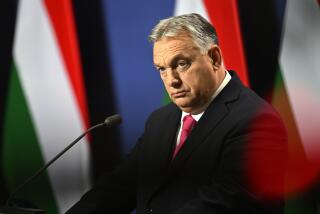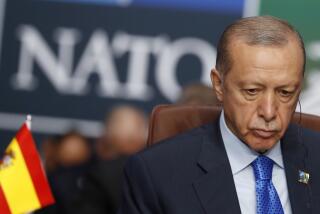EUROPE ON THE ROAD TO UNITY : NEWS ANALYSIS : A Divided Europe Ponders How to Turn <i> ‘Oui’</i> Into ‘We’
BRUSSELS — France’s grudging ratification of the Maastricht Treaty on European political and economic union leaves the European Community face to face with the question it has been trying to duck for more than three months: What to do about Denmark?
With the French on board, 11 of the EC’s 12 nations seem likely to ratify the treaty by the end of the year, although opponents in the British Parliament intend to fight it. But by EC rules, all 12 must ratify before the treaty can take effect. And 50.7% of Danish voters turned thumbs down June 2.
The Danish government has no intention of asking its citizens to vote again on the same treaty. Even if it did, polls show the treaty would be defeated more convincingly the second time than the first.
Instead, European leaders are looking for a formula that would somehow appease Danish voters without requiring the treaty to be negotiated and ratified all over again.
Regardless of the outcome of the Danish problem, the rocky road to ratification has had a chastening effect on the EC’s headquarters in Brussels and on national political leaders such as French President Francois Mitterrand and German Chancellor Helmut Kohl, the driving forces behind the treaty.
So intent were Europe’s leaders on forging a more perfect union that they forgot about the wishes of their own citizens.
The closeness of the French vote, on the heels of the Danish “no,” underlines the message that had been rising from all corners of the EC: We, the people, are not ready to jeopardize our national identities and transfer more and more power to the faraway bureaucrats in the EC’s Brussels headquarters.
“Many French people have expressed anxieties to which we have to respond with more democratic institutions and policies that they can understand more easily,” Jacques Delors, the EC’s top bureaucrat as president of its Executive Commission, said Sunday.
Even if the Danes can be brought around, Europe may never look precisely like the vision outlined in the treaty initialed by the 12 EC leaders last December in the Dutch town of Maastricht.
No amount of agreement on paper can erase the boundaries that still divide Europe into nations that have spent much of their histories at war with each other. Last week’s upheaval in Europe’s currency markets--which was bred in part by uncertainty over the outcome of the French vote--provided a vivid reminder that when national interests conflict with European interests, national interests still come first.
The economic equivalent of hand-to-hand combat broke out as Britain and Italy, their currencies under siege in the international marketplace, dropped out of the system that links the values of 11 of the EC’s currencies. Britain in particular blamed Germany’s high interest rates for causing the turmoil. Germany retorted that Britain need look no further than its own, recession-bound economy.
After last week’s developments, it appears likely that the Maastricht Treaty’s economic centerpiece--a single currency by 1999 for all nations that can bring their inflation rates, interest rates and budget deficits down to moderate levels--will have to be rethought.
“Monetary union has to be much more pragmatic and less rigid,” said Nigel Gault, a senior economist with DRI-McGraw Hill in London.
EC leaders regard a single currency as the logical extension of the community’s grand initiative of the past six years: its so-called EC-92 program of transforming itself into a true single economic market by the first of next year.
The EC says it has already put in place 90% of the necessary regulations for the single market, regulations that will tear down barriers to the movement of goods, services, money and people among the EC’s member nations. France’s ratification of the Maastricht Treaty should allow the EC to get on with the rest of the job.
For a community that was founded 35 years ago as a trade bloc, these steps toward economic union are relatively easy. It will be much harder for the EC to move toward the degree of political union foreseen by the Maastricht Treaty.
The EC has only just begun to work toward the treaty’s political objectives--notably the establishment of joint foreign policy and even the creation of joint military units.
The EC’s disarray over the violence in the former Yugoslavia offers one measure of the difficulty of reaching consensus among 12 disparate nations; the EC has not been able to extend diplomatic recognition to the former Yugoslav republic of Macedonia because a single EC member, Greece, objects that the name belongs to one of its own provinces.
Will the Maastricht Treaty streamline the EC’s foreign policy-making apparatus? Not necessarily. The treaty is particularly ambiguous on the touchiest issues; rather than providing for joint foreign policy by majority vote, for example, it merely urges each of the 12 nations not to use its veto to thwart the will of the other 11.
Simply having the Maastricht Treaty in place, however, will have a significant impact on the EC’s relations with the rest of Europe.
First, it will allow negotiations to go ahead with four non-EC nations of Western Europe--Sweden, Finland, Austria and Switzerland--that are seeking entry to the club. As long as the treaty’s fate was unclear, the non-EC nations could not have known what kind of a club they were trying to join.
The treaty will also bear on the vital relationship between Western Europe and the emerging democracies of Eastern Europe. But experts disagree over whether the effect will be to draw the two sides closer together or to push them further apart.
All this, of course, presupposes the EC can solve what it euphemistically calls its Danish problem. But no one has yet come forward with a workable suggestion.
If anybody has any ideas, he’s keeping them a tightly held secret.
EC Commissioner Leon Brittan, commenting on the Danish problem after the French vote, said, “I’m sure that can be resolved.” But he offered no specifics.
Danish officials have promised to identify some possibilities shortly after the French vote--assuming that the vote was “yes.” But they have ruled out a second referendum identical to the first, and they have said any solution will have to go before their voters after Jan. 1, when the treaty was supposed to have taken effect.
The rest of the EC, which has fought hard to ratify the Maastricht Treaty as now drafted, has insisted that it will not renegotiate the treaty because that would require a fresh round of ratification.
That leaves everyone groping for some middle ground--something that will appease Danish voters without materially changing the treaty.
One possibility--probably intolerable to the Danes--would knock Denmark out of the community altogether and leave it with nothing but economic links to the EC.
Intractable as the Danish problem seems, it is nothing compared with what the consequences would have been if only a few thousand more French voters had turned thumbs down. That would have buried the treaty once and for all. Now it is merely in intensive care.
More to Read
Sign up for Essential California
The most important California stories and recommendations in your inbox every morning.
You may occasionally receive promotional content from the Los Angeles Times.










